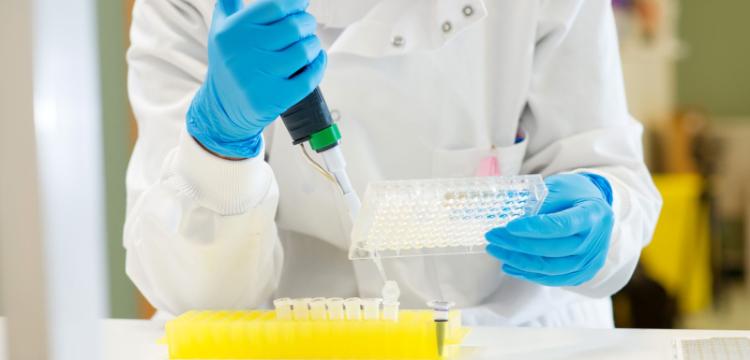Queen’s University celebrates incredible legacy gift on World Cancer Research Day
Thanks to a legacy gift from a Queen’s University alumnus, seven major cancer research projects which were put on hold due to grant cuts, are able to restart.

Each year, over 9,000 people in Northern Ireland are diagnosed with cancer, a number which is growing as our population ages. The Patrick G Johnston Centre for Cancer Research (PGJCCR) at Queen’s is internationally recognised for its ground-breaking research, housing over 200 staff and students all working towards a common goal of improving the lives of patients with cancer. As with everyone in society over the past six months, their lives have been completely changed due to the COVID-19 pandemic.
A key issue highlighted by the pandemic is the extent to which funding for cancer research is reliant on the charitable sector. While some projects receive government support from the medical research council, the vast majority of research teams in the PGJCCR are funded by charities such as the Queen’s University of Belfast Foundation and Cancer Research UK.
In April this year, a team of seven researchers at Queen’s learned that one of their largest UK charity funders had taken the difficult decision to reduce the value of response-mode grants by 5%. This meant an unforeseen shortfall in funding of approximately £61,000.
The researchers are working on a number of treatments and diagnostic tools for a range of cancer types, including identifying and testing new treatment options to prevent disease progression in colorectal cancer; studying the effect of medication use on cancer risk and survival; discovering new ways to prevent oesophageal cancer and improve survival for the disease; researching new treatments that may improve the effectiveness of chemotherapy given to patients to treat colorectal cancer; identifying DNA damage driven immune responses in breast cancer and genetically inherited breast cancer; and analysing genomic datasets for the discovery of biomarkers and mechanisms of oesophago-gastric cancers resistant to chemotherapy.
Concurrently, the Queen’s Foundation had gratefully received a substantial legacy gift, from Arts and Theology alumnus, Mr Alexander Leckey from Belfast.
In his will Mr Leckey had specified that his gift was to be unrestricted, which meant that it was the decision of the Foundation Board how the monies were used to fund the most urgent needs of the University at the time. The Foundation agreed to use £60,000 of the gift to enable the PGJCCR staff to go back to the labs in June and July and continue their life-saving research.
One of the researchers impacted was leading researcher at The Patrick G Johnston Centre for Cancer Research, Dr Philip Dunne, who said: "The Patrick G. Johnston Centre for Cancer Research is internationally recognised for its life-saving cancer research.
"This grant will allow researchers, like myself, to continue to work towards our common goal of improving the lives of patients diagnosed with cancer."
Professor Chris Scott, Director (Acting) from the Patrick G. Johnston Centre for Cancer Research at Queen’s University, said: "We are extremely grateful for this unrestricted legacy donation given to us during these extremely challenging times for cancer research.
"This legacy gift will allow our world-class researchers at The Patrick G Johnston Centre for Cancer Research to continue their important, life-saving work, and has the potential to positively impact patient care by discovering new and better ways of diagnosing and treating cancer, both locally and globally."
Legacy Manager at Queen’s, Susan Wilson, added: “The legacy funding has also been used to purchase a vital piece of research equipment which is instrumental in our current COVID-19 research projects, facilitating time-critical work on drug re-purposing, co-infections and viral diagnosis carried out by Professor Ultan Power and his teams.
"This wonderful gift from our past friend, Alexander, has been such a blessing during these difficult times. It has enabled urgent, critical projects to be created to meet these unexpected challenges, while ensuring that other life-threatening projects, like cancer research can continue unimpeded."
To celebrate World Cancer Research Day on 24 September we are delighted to invite you to join us for an exclusive panel discussion and live Q&A online event featuring academics and researchers from The Patrick G Johnston Centre for Cancer Research. To find out more and for details on how to join the event email: alumni@qub.ac.uk